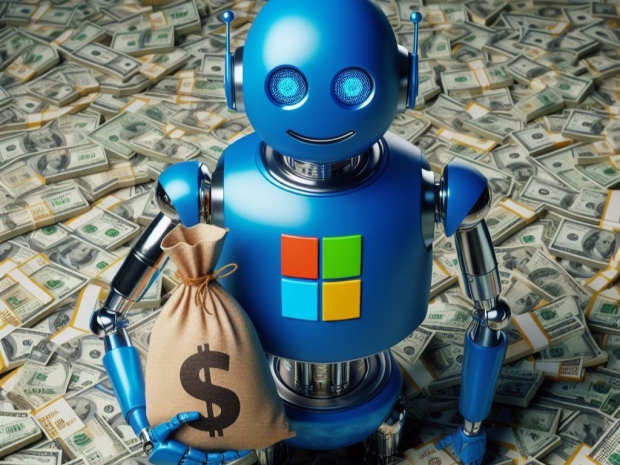Microsoft reported adjusted earnings per share of $2.93 on revenue of $62 billion, smashing expectations of adjusted EPS of $2.78 on revenue of $61.1 billion.
But shares of the company dipped slightly after the announcement, as some traders cashed in on the gains.
Microsoft's cloud revenue, which is where the real money is made, topped out at $33.7 billion, beating estimates of $32.2 billion.
The company's Intelligent Cloud business, which includes its Azure service, came in at $25.8 billion versus expectations of $25.3 billion. According to the company, AI services added six percentage points of growth to Azure revenue, up from three percentage points last quarter.
Microsoft boss Satya Nadella said in a statement: "We’ve moved from talking about AI to applying AI at scale. By infusing AI across every layer of our tech stack, we’re winning new customers and helping drive new benefits and productivity gains across every sector.”
Microsoft has been one of the biggest winners of the AI craze, sending shares soaring 50% over the last 12 months and making it worth over $3 trillion.
As of Tuesday afternoon, Microsoft was the richest company in the world by market cap, beating its old rival Apple, which has been hit by recent stock downgrades over fears of slow iPhone sales in China, and the lack of anything new worth buying.
On the productivity front, Microsoft’s Productivity and Business Processes revenue hit $19.25 billion, just ahead of estimates of $19.03 billion. The company’s More Personal Computing business, which includes sales of its Windows software and Xbox gaming division, generated $16.89 billion.
Microsoft's AI efforts are everywhere in its business, and making sure that pays off is something the company is very focused on. So far, it has made money from its AI efforts via generative AI cloud services, its Copilot for Microsoft 365 productivity platform, and its Copilot Pro for consumers.
Earlier this month, the company opened up its Copilot for Microsoft 365 to all businesses, getting rid of a previous requirement that customers needed to have 300 employees or more to sign up for the paid service.
Clients pay $30 per user per month for access to the software. Copilot Pro for consumers, meanwhile, costs $20 per month per user, and is meant for consumer customers who want to use Copilot’s more advanced features.
Microsoft, Google and Amazon, have been splashing billions of dollars into AI investments over the last year as they each try to get the upper hand in the race to be the AI software leader.
Microsoft got an early lead thanks to its investment in ChatGPT developer OpenAI, but Google and Amazon are catching up. Google released its powerful Gemini AI model in December, and, in September, Amazon announced a $4 billion investment in AI company Anthropic giving the cloud giant a minority stake in the firm.

